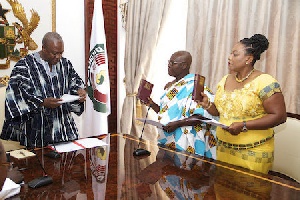 President Mahama swearing in Josephine Nkrumah an Nti Amoah
President Mahama swearing in Josephine Nkrumah an Nti Amoah
There is a case every law student must have come across. This is the American case of Marbury v Madison. President John Adams and his federalist party had been defeated in the 1800 elections. Thomas Jefferson running on the ticket of the Republicans had won the elections. As part of John Adams final acts, the incumbent President created new federal circuit judge positions. It did not end there. He went ahead to appoint judges to fill the positions created. The federalist controlled senate approved the nominations.
These judges were referred to as the “midnight judges”. William Marbury was part of the newly appointed “midnight judges”. The document authorising him to take office was among a handful that were sealed but not delivered before John Adams’ term expired.
When Jefferson took office, he did the expected. He refused to recognise the appointment of the judges – with William Marbury being one of them. Marbury brought the issue before the United States Supreme Court. The Supreme Court recognised his legal right to the office.
A strikingly similar situation is brewing at home. The incumbent President has lost an election. He will be out of office in less than two weeks. But before he leaves, he has made a number of key decisions and appointments.
A new Commissioner for the Commission on Human Rights and Administrative Justice (CHRAJ) has been appointed. A new head for the National Commission on Civic Education (NCCE) has been appointed. National Service allowance has been increased by 40 per cent. A 12.5 per cent increase in salary for public sector workers is in the offing.
But what is the President to do in his last weeks. Must a president take his leg off the pedal? Or must he paddle as hard as he can in his final days? These are difficult questions. They lend themselves to no easy answer. They are usually down to the personal choices.
A reasonable response would be – be considerate. In whatever you do just be considerate. And be mindful of the long-term implications. Don’t commit your successor to arrangements that may throw his plans out of kilter.
The government is still in charge of the affairs of the state. The security and running of the state is in the hands of the current administration. The government, therefore, is competent to determine the course that the nation takes.
In exercising its powers however, there must be restraints. The making of critical “midnight” appointments (while it may be completely legitimate) does not augur well for the transition process. Especially when it is entering into financial obligations, which the incoming administration would have to take care of.
The Chairman of the Public Accounts Committee, Mr Kwaku Agyeman Manu, has waded into this conversation. In an interview with citifm, he quizzed: “are you leaving resources there to pay for the commitment or you are just committing expenditure for someone to come and raise money to pay?”
The Ghana Integrity Initiative has rightly pointed out that some of these midnight contractual agreements will lead to judgement debts. A statement that brings this fear home is one by the New Patriotic Party (NPP), which says that it reserves the right to review contracts and agreements entered into by government.
It would seem that this statement by the incoming administration ignores the fact that the state is a continuum.
Certainly judgement debts and constitutional breaches await the incoming government – if they decide to tamper with the agreements and appointments being entered into with the government.
Interestingly, the Premium Times of Nigeria in June 2015 published a story with the title: “Joda Committee to Buhari: Sack Jonathan’s last-minutes appointees, review contracts of last 18 months.” The title says it all. Much as we have our unique experiences, we ought to learn from others.
These actions by the President are sincerely unnecessary. Since conceding, he has been very state manly. He ought to continue in that way. The practice in most advanced jurisdictions is for the government to ‘back off’ in its final weeks.
In the United States, the government is considered as a ‘lame duck’. It does not do much. It grants pardons here and there. And most importantly puts measures in place to welcome the new entrant.
A lot has been said about a precedent set by former President John Agyekum Kufuor. He announced increases in public sector wages between 16-32 per cent. That was condemned across board.
A former Finance Minister, Yaw Osafo Maafo condemned the decision of President Kufuor. “There should have been a silent memorandum to the NDC detailing what has been discussed and agreed, for them to have a look at it and incorporate it in the budget”, he said.
Nobody would have expected this government to do what it is currently doing – especially because it was at the receiving end. But it is politics as usual. Expediency is king!